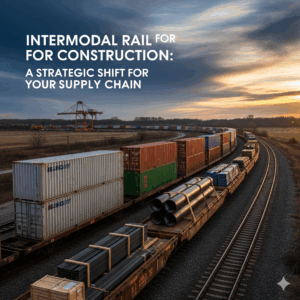Freight Shipping Insurance: Protect Every Shipment. Safeguard Your Business.
In 2025, the freight shipping landscape is more dynamic and challenging than ever before. With increasing freight volumes, complex supply chains, and a growing variety of transportation modes across Canada and beyond, protecting your cargo during shipment has become an essential priority for businesses of all sizes. This is where freight shipping insurance plays a pivotal role, providing crucial financial protection against loss, damage, or theft while goods are in transit.
Choosing the best freight shipping insurance for your business can be a daunting task. There are many providers, policy types, and coverage options to consider. Yet, making the right decision is critical to safeguarding your shipments, reducing potential financial risk, and ensuring business continuity. This comprehensive 2025 guide will walk you through everything you need to know about freight shipping insurance—what it covers, why it’s necessary, and how to select the best policy tailored to your shipping needs.
Why Freight Shipping Insurance Matters More Than Ever in 2025
The shipping process exposes cargo to a wide array of risks. Whether your freight moves by rail, truck, or a combination of modes, it faces threats such as accidents, rough handling, theft, natural disasters, and more. The financial impact of these incidents can be substantial, affecting not only your bottom line but also customer satisfaction and your company’s reputation.
Many shippers mistakenly rely on carrier liability coverage or their general business insurance to protect shipments. However, carrier liability typically offers limited coverage—often based on weight rather than cargo value—and excludes many types of damage. Similarly, general insurance policies may not cover goods once they leave your facility. Freight shipping insurance fills these critical coverage gaps by providing dedicated protection specifically while your cargo is in transit.
In 2025, with supply chains becoming more interconnected and shipment volumes rising, having robust freight shipping insurance is no longer optional but a strategic business imperative. It allows you to declare the full value of your cargo and receive reimbursement if something goes wrong during shipment, helping you avoid costly out-of-pocket losses.
Key Components of Freight Shipping Insurance Coverage
Understanding the key components of freight shipping insurance policies will help you make informed choices. Most freight shipping insurance covers:
- Loss or theft: Protection against cargo that is lost or stolen while being transported.
- Physical damage: Coverage for damage caused by accidents, mishandling, weather exposure, or other perils.
- Total or partial loss: Compensation if the entire shipment or part of it is lost or damaged beyond use.
- Coverage across transport modes: Insurance that protects shipments traveling by rail, truck, or intermodal transport.
- Claims support: Assistance with the claims process to ensure timely reimbursement.
Some policies may also offer add-ons or optional coverage such as protection against delay-related financial impacts or extended coverage for storage periods.
Factors to Consider When Choosing Freight Shipping Insurance
To select the best freight shipping insurance for your business, carefully evaluate the following factors:
- Declared Value of Cargo: Insure your freight for its accurate value to ensure full reimbursement in the event of loss or damage. Underinsuring can leave you financially vulnerable.
- Type of Goods: Fragile, high-value, or hazardous goods may require specialized coverage or higher limits. Some goods may also have unique handling or packaging requirements.
- Shipping Modes and Routes: Different modes (rail, truck, intermodal) carry different risks. Shipments traveling through high-risk areas or over long distances may need enhanced coverage.
- Carrier Liability Limits: Understand what your carrier covers and identify coverage gaps. Freight shipping insurance should complement—not duplicate—carrier liability.
- Policy Exclusions and Limits: Review what is excluded from coverage, such as improper packaging or certain natural disasters, to avoid surprises.
- Cost vs. Coverage: Balance premium costs with the level of protection offered. Cheapest isn’t always best; comprehensive coverage often saves money long-term.
- Claims Process and Support: Opt for insurers or platforms that provide straightforward claims procedures and responsive customer service.
- Regulatory and Industry Requirements: Ensure compliance with relevant regulations and industry standards, especially for specialized freight.
How RailGateway Simplifies Freight Shipping Insurance for Canadian Shippers
Navigating freight shipping insurance can be complicated, especially when coordinating multiple shipments or complex logistics. RailGateway provides a streamlined platform where Canadian shippers can book freight shipments and easily add insurance coverage tailored to their cargo’s value and risk profile.
With RailGateway, you gain access to trusted insurance providers offering competitive premiums and comprehensive protection options integrated directly into your shipping workflow. This integration reduces administrative burden and helps you ensure that every shipment is properly insured without extra hassle.

Here’s what you need to consider when selecting freight insurance that’s right for your business:
1. Understand Your Shipping Profile and Risk Exposure
Start by reviewing your shipping patterns. Are you shipping high-value electronics, fragile goods, or perishable items? Do your shipments travel within Canada or across borders? Through urban centers or remote areas?
Each of these factors impacts your risk exposure. For instance, cross-border shipments may face customs delays, while perishable items may suffer during extended transits. Shipping high-theft items like electronics through certain regions also increases the likelihood of losses.
Knowing your risk profile helps you match coverage to your business reality.
Helpful Link: Government of Canada – Importing and Exporting
2. Choose Full-Coverage Policies, Not Just the Basics
Too often, businesses assume their carrier liability or basic insurance covers them completely. Unfortunately, these minimal protections usually cover just a fraction of the shipment’s value—and often require the shipper to prove fault before any claim is paid.
What should comprehensive freight shipping insurance include?
- Full declared value coverage
- Theft and pilferage protection
- Spoilage coverage for temperature-sensitive goods
- Coverage for delays and rerouting due to weather or logistics
- Damage from handling or transport
- Acts of nature or accident-related losses
Always read the fine print. Avoid policies with long lists of exclusions, unclear claim processes, or limited compensation terms.
3. Partner With a Freight Shipping Insurance Expert
When shipping through rail or intermodal networks, you need more than generic coverage. You need a provider that understands the nuances of Canadian logistics—like extended rail corridors, multiple carrier handoffs, and jurisdictional complexities.
RailGateway.ca specializes in freight insurance for Canadian businesses. We bring decades of expertise in both freight forwarding and risk management to ensure your shipments are protected from start to finish.
We tailor our insurance options to match your transportation method—whether it’s intermodal freight, LTL shipping, or full truckloads.

4. Prioritize Ease of Use: Integrated Freight + Insurance Platforms
The best insurance is the one you don’t have to think about—because it works seamlessly within your existing systems. Choose a platform that lets you quote, book, insure, and manage freight in one dashboard.
With RailGateway’s all-in-one shipping and insurance solution, you can:
- Instantly quote shipments and insurance side by side
- Automatically activate insurance with booking
- Store and retrieve all documentation digitally
This streamlined experience reduces errors, saves time, and ensures every shipment is protected.
5. Demand Transparent Pricing and Reliable Claims Support
Freight shipping insurance should be clear, affordable, and responsive—not filled with hidden fees and red tape. Before choosing a provider, ask:
- Are premiums flat-rate or variable?
- Are all charges disclosed upfront?
- What is the average claims turnaround time?
At RailGateway, we provide flat-rate insurance pricing, no surprise fees, and a dedicated claims team. If a shipment issue arises, we resolve it quickly—keeping your operations running smoothly.
Final Thoughts: Securing Your Business Future with the Right Freight Shipping Insurance in 2025
As we wrap up this ultimate guide on how to choose the best freight shipping insurance for your business in 2025, it’s important to reflect on the critical role that freight shipping insurance plays in today’s fast-paced logistics environment. Whether you are a small business owner shipping a few packages a month or a large enterprise managing complex supply chains, freight shipping insurance is the backbone of risk management when moving goods across Canada and internationally.
The stakes in freight shipping are high. Cargo loss, theft, or damage can lead to severe financial setbacks, disrupt supply chains, delay deliveries, and erode customer trust. By investing in tailored, comprehensive freight shipping insurance, you are protecting your bottom line, safeguarding your reputation, and ensuring operational continuity in an ever-evolving freight landscape.
Why Freight Shipping Insurance is Non-Negotiable in 2025
In 2025, freight shipping insurance is no longer an optional add-on; it’s a fundamental component of any successful shipping strategy. The global freight industry faces constant challenges: unpredictable weather, security threats, accidents, and the sheer complexity of multimodal transport routes. Freight shipping insurance mitigates these risks by offering financial coverage that exceeds the limited scope of carrier liability.
Carrier liability is typically inadequate because it reimburses cargo based on weight rather than value and excludes many types of damage or loss. Freight shipping insurance fills this gap by allowing you to declare the full value of your goods, ensuring you receive fair compensation if your shipment is compromised during transit.
The Financial and Operational Benefits of Freight Shipping Insurance
The financial benefits of freight shipping insurance are clear. When an incident occurs, having appropriate coverage means you avoid expensive out-of-pocket costs that could otherwise derail your cash flow or profitability. Insurance payouts help cover the cost of replacing or repairing goods, managing customer claims, and addressing logistics delays.
Operationally, freight shipping insurance enhances supply chain resilience. Knowing that your cargo is insured empowers you to make smarter shipping decisions, such as choosing cost-effective but riskier routes or carriers without compromising on security. It also facilitates smoother relationships with partners and customers by demonstrating your commitment to reliability and professionalism.
Selecting the Best Freight Shipping Insurance Policy
Choosing the right freight shipping insurance policy involves a thorough assessment of your specific shipping needs and risks. Key considerations include:
- Coverage Scope: Ensure the policy covers the full range of risks your shipment might face, including theft, damage, and total loss.
- Declared Cargo Value: Accurately declare your cargo’s value to guarantee adequate reimbursement.
- Policy Exclusions: Understand what is not covered to avoid surprises during claims.
- Claims Support: Opt for insurers known for responsive and efficient claims processing.
- Premium Costs: Balance coverage benefits against premium expenses to find the best value.
By carefully comparing policies and working with trusted insurance providers, you can secure coverage that perfectly fits your shipping profile.
Freight Shipping Insurance and Regulatory Compliance
In addition to financial protection, freight shipping insurance can help you comply with various regulatory and contractual requirements. Certain industries and international shipping routes mandate minimum insurance coverage levels to mitigate risk and liability. Having the right insurance helps you avoid fines, penalties, or shipment delays due to non-compliance, streamlining your logistics operations.
Leveraging Technology: How RailGateway Enhances Freight Shipping Insurance
Technology is revolutionizing how businesses manage freight shipping insurance, and RailGateway is at the forefront of this transformation for Canadian shippers. RailGateway’s platform integrates freight shipping insurance options directly into the shipment booking process, making it easy and efficient to protect your cargo.
This seamless integration allows you to:
- Instantly quote and purchase freight shipping insurance based on your cargo’s declared value.
- Customize coverage to align with specific shipment risks and transport modes.
- Simplify documentation and claims management, saving time and reducing administrative burdens.
- Access expert support to help you navigate policy options and claims procedures.
By using RailGateway, you gain peace of mind knowing that your shipments are comprehensively insured, allowing you to focus on growing your business instead of worrying about freight risks.
The Road Ahead: Staying Ahead of Freight Shipping Risks in 2025
The freight industry will continue to evolve in 2025, with new technologies, regulations, and market dynamics shaping how goods move across borders and provinces. As risks become more complex, having the best freight shipping insurance coverage will be crucial to staying competitive and resilient.
Proactively reviewing and updating your freight shipping insurance policies as your business grows and shipping needs change ensures ongoing protection. Regularly engage with your insurance provider or platform like RailGateway to optimize your coverage and adapt to emerging risks.
Final Thoughts: Freight Shipping Insurance is Your Business’s Best Ally
Choosing the best freight shipping insurance is more than just purchasing a policy — it’s about investing in the security and success of your entire supply chain. The right coverage protects you financially, supports compliance, and enables smarter shipping decisions, ultimately boosting your bottom line.
Don’t leave your shipments vulnerable to the many risks inherent in freight transportation. Instead, leverage the benefits of freight shipping insurance in 2025 to build a robust, reliable, and profitable shipping operation.
For Canadian shippers looking for a trusted partner in freight shipping and insurance, RailGateway offers an unparalleled combination of freight booking convenience and insurance integration. Simplify your shipping process, get competitive insurance rates, and secure your cargo with confidence — all from one innovative platform.
Visit railgateway.ca today to discover how RailGateway can help you protect your shipments, reduce risk, and propel your business forward in 2025 and beyond.

FAQ
1. What is freight shipping insurance and why is it important?
Freight shipping insurance is a specialized insurance policy that protects cargo against loss, theft, or damage while it is being transported from one location to another. Unlike carrier liability, which often provides minimal coverage based on cargo weight, freight shipping insurance allows shippers to declare the full value of their goods and secure financial reimbursement in case of mishaps. In 2025, with increasingly complex supply chains and unpredictable risks, freight shipping insurance is essential for protecting your business’s financial health and maintaining reliable customer service.
2. How does freight shipping insurance differ from carrier liability?
Carrier liability is the legal responsibility a shipping carrier assumes for cargo damage or loss, but its coverage limits are typically low and calculated per pound, not the actual value of the shipment. Freight shipping insurance, on the other hand, offers customized coverage based on the declared value of your goods, providing much broader protection. This means that while carrier liability might reimburse only a fraction of the true value, freight shipping insurance ensures full compensation, reducing financial exposure during shipping.
3. What types of cargo can be covered under freight shipping insurance?
Freight shipping insurance can cover a wide range of cargo types, including consumer goods, industrial equipment, electronics, perishable items, hazardous materials, and fragile or high-value shipments. Some policies may offer specialized coverage for unique cargo requiring extra care or specific handling. It’s important to disclose the nature of your goods accurately to ensure your policy offers appropriate protection tailored to your shipment’s characteristics.
4. Does freight shipping insurance cover all modes of transportation?
Yes, freight shipping insurance typically covers cargo transported via multiple modes including rail, truck, air, and intermodal combinations. Since each mode carries its own risks, insurance providers tailor policies to address these variations, ensuring comprehensive coverage across the entire transit route. This multimodal protection is crucial for businesses relying on complex supply chains involving various transportation methods.
5. How do I determine the right declared value for my freight shipping insurance?
The declared value should reflect the true commercial value of the goods being shipped, including the cost of the product, packaging, freight charges, and any additional expenses related to preparing the shipment. Under-declaring value to reduce premiums is risky as it limits the compensation you receive in case of loss or damage. Work closely with your insurance provider or platform to accurately calculate and declare your shipment’s value for optimal protection.
6. What are common exclusions in freight shipping insurance policies?
While freight shipping insurance covers many risks, common exclusions include damages resulting from improper packaging, inherent product defects, delays, wear and tear, and losses caused by war or nuclear incidents. Some policies may also exclude certain natural disasters or specific high-risk routes unless additional coverage is purchased. Reviewing the policy’s terms and conditions thoroughly helps you understand what is and isn’t covered, preventing unpleasant surprises during claims.
7. How can freight shipping insurance save my business money?
Freight shipping insurance saves money by protecting you from costly losses due to cargo damage or theft during transit. Without insurance, you would have to absorb the full cost of lost or damaged goods, which can be financially devastating, especially for high-value shipments. Insurance payouts help maintain cash flow, reduce business interruptions, and preserve customer relationships by ensuring timely resolution of claims.
8. Is freight shipping insurance mandatory for all shipments?
Freight shipping insurance is not legally mandatory for all shipments but is strongly recommended to mitigate risks inherent in transporting goods. Certain industries, clients, or shipping contracts may require proof of insurance as a condition of doing business. In many cases, shippers opt for insurance to comply with contractual obligations or to enhance trustworthiness and professionalism in the marketplace.
9. How quickly can I get freight shipping insurance coverage for my shipment?
Thanks to digital platforms like RailGateway, you can obtain freight shipping insurance coverage almost instantly when booking your shipment. These platforms offer real-time quotes and allow you to purchase tailored insurance policies during the shipping process. This immediate access ensures that your cargo is protected from the moment it leaves your facility until delivery.
10. What should I look for in a freight shipping insurance provider?
When choosing a freight shipping insurance provider, look for a company with a strong reputation, transparent policy terms, competitive premiums, and excellent claims support. Providers who specialize in freight shipping insurance and understand the nuances of logistics and multimodal transport are preferable. Additionally, consider platforms that integrate insurance with your freight booking to streamline operations and reduce administrative burdens.
11. How does the claims process work for freight shipping insurance?
In the event of cargo loss or damage, the claims process typically begins with notifying your insurance provider and submitting detailed documentation, including proof of shipment, photos of damage, and an itemized inventory of the goods. Efficient providers offer support throughout the claims process, helping you gather necessary evidence and expedite reimbursement. Promptly reporting claims and maintaining clear records improves the likelihood of a smooth and successful resolution.
12. Can freight shipping insurance cover delays or indirect costs related to shipments?
Standard freight shipping insurance primarily covers physical loss, theft, or damage of cargo during transit but generally does not cover delays or indirect financial losses such as lost sales or penalties. However, some insurers offer additional coverage or endorsements that may protect against certain delay-related costs. It’s important to discuss your specific business needs with your insurance provider to determine whether such optional coverages are available and suitable.
13. What role does packaging play in freight shipping insurance?
Proper packaging is critical to protecting cargo during transit and is often a requirement for freight shipping insurance coverage. If damage occurs due to insufficient or improper packaging, insurers may deny claims. Investing in high-quality, compliant packaging materials and techniques not only minimizes damage risk but also supports claim approvals, saving money and ensuring goods arrive safely.
14. How can RailGateway help me with freight shipping insurance in Canada?
RailGateway is a leading freight booking platform in Canada that simplifies the process of obtaining freight shipping insurance. When booking shipments through RailGateway, you can easily add insurance coverage tailored to your cargo’s value and transport mode, all within the same platform. This integration saves time, reduces paperwork, and ensures that your freight is comprehensively protected from pickup to delivery.
15. How often should I review and update my freight shipping insurance coverage?
It’s best practice to review your freight shipping insurance coverage regularly, especially when your shipping volume, cargo types, or routes change. Annual reviews or after major business developments help ensure your policy remains aligned with current risks and operational needs. Staying proactive about insurance updates helps you avoid coverage gaps and maintain maximum protection for your shipments.





